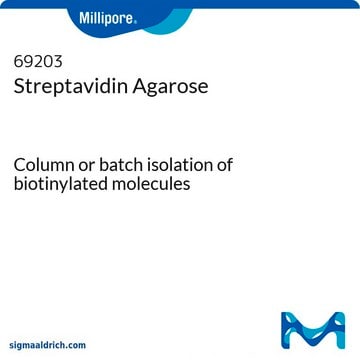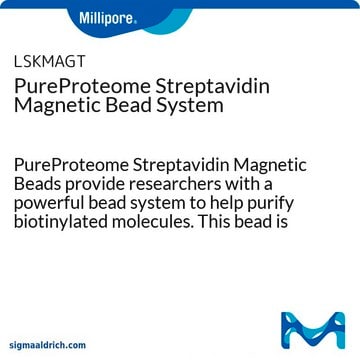GE17-5113-01
Streptavidin Sepharose™ High Performance
Cytiva 17-5113-01, pack of 5 mL
Synonym(s):
affinity chromatography medium, high performance affinity resin, biotinylated proteins purification
About This Item
Recommended Products
packaging
pack of 5 mL
manufacturer/tradename
Cytiva 17-5113-01
storage condition
(20% Ethanol)
matrix
highly cross-linked 6% agarose
avg. part. size
34 μm
cleaning in place
2-10.5
working range
4-9
capacity
binding capacity(>300 nmol biotin/ml medium 6 mg biotinylated BSA/ml medium)
storage temp.
2-8°C
Looking for similar products? Visit Product Comparison Guide
General description
Purified Streptavidin isolated from Streptomyces avidinii is immobilised on Sepharose™ High Performance. The base matrix is a rigid, highly cross-linked beaded agarose with high chemical stability. The immobilised streptavidin binds biotin and biotinylated substances through affinity chromatography.
Features and Benefits
- Streptavidin immobilized to Sepharose™ High Performance for purification of biotinylated compounds
- Extremely useful for exploiting either the strong interactions of biotin and streptavidin or the somewhat weaker interactions of 2-iminobiotin and streptavidin.
- 34 μm bead size for improved resolution
Storage and Stability
Analysis Note
Legal Information
Signal Word
Warning
Hazard Statements
Precautionary Statements
Storage Class Code
3 - Flammable liquids
Choose from one of the most recent versions:
Certificates of Analysis (COA)
Sorry, we don't have COAs for this product available online at this time.
If you need assistance, please contact Customer Support.
Already Own This Product?
Find documentation for the products that you have recently purchased in the Document Library.
Customers Also Viewed
Articles
This page shows how to convert between flow velocity and volumetric flow rate in affinity chromatography of antibodies.
This page shows how to solve practical problems that may occur when running an affinity chromatography column.
Protocols
How to separate biotin and biotinylated substances by affinity chromatography using HiTrap Streptavidin HP and Streptavidin Sepharose High Performance products from Cytiva.
This page shows how to purify or remove biotin and biotinylated substances with Streptavidin Sepharose High Performance from Cytiva.
Sample Preparation for Affinity Chromatography in Specific Groups of Biomolecules
This page shows how to convert between linear flow and volumetric flow rates in affinity chromatography.
Our team of scientists has experience in all areas of research including Life Science, Material Science, Chemical Synthesis, Chromatography, Analytical and many others.
Contact Technical Service








